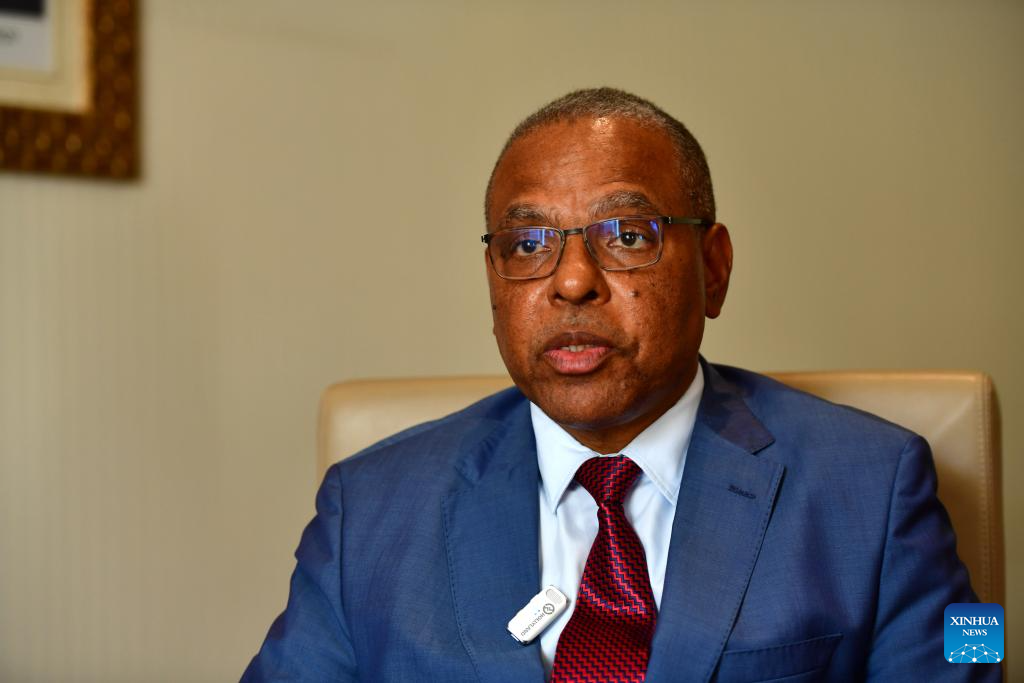Interview: China's collaboration crucial for Angola's industrialization, says minister

Rui Miguens de Oliveira, Angola's minister of industry and commerce, speaks during an interview with Xinhua in Luanda, capital of Angola, March 6, 2024. (Xinhua/Dai He)
LUANDA, March 14 (Xinhua) -- "China's presence and collaboration at various levels -- state level, public enterprise level and private business level -- have been crucial for our industrial relaunch," said Rui Miguens de Oliveira, Angola's minister of industry and commerce, in a recent interview with Xinhua.
Regarding Angola's industrialization process, Rui Miguens expressed gratitude for China's strong support in the post-war rebuilding and construction of new infrastructure.
The minister emphasized that the participation and presence of Chinese companies and financial resources were fundamental for the initial recovery of destroyed infrastructure, such as bridges, roads, energy transmission lines and water supply systems. "All of these are infrastructures necessary for general economic and social development, but particularly essential for our industry," he said.
Rui Miguens noted that following the restoration of infrastructure, Angola witnessed investments from Chinese private companies in various industrial sectors, bringing new vitality and showcasing Angola's industrial potential to the world.
"The fact is that, at this moment, the largest private investors in Angola are likely Chinese investors. They are the best example of Angola, where it is possible to invest, create jobs, establish industries, and allow entrepreneurs to earn profits honestly," he said.
More than 400 Chinese companies currently operate in Angola, with investments exceeding 24 billion U.S. dollars. Many of these companies are engaged in industrial production, running factories that produce construction materials, plastics, daily-use products, steel, batteries, and other items.
"I was very impressed with the level of development I found in Chinese society and found the model that China has for industrialization, bringing large sections of the population that were previously just rural into the industry," he said.
Rui Miguens believed that China's high-tech manufacturing and industrial development have benefited ordinary households, thereby improving people's lives, and Angola can learn from China's industrialization experience to improve the income of its people.
Since China and Angola established diplomatic relations 41 years ago, Angola has emerged as China's second-largest trading partner in Africa, with bilateral trade reaching 23 billion U.S. dollars in 2023. Chinese companies have rebuilt or constructed new 2,800 km of railways, 20,000 km of roads, over 100,000 social housing units, more than 100 schools, and more than 50 hospitals in the southern African nation.
In the past decade, cooperation between China and Angola under the Belt and Road Initiative has yielded fruitful results, Rui Miguens said, describing the initiative as promoting economic and social development on the African continent and helping Africa integrate into global trade.
It enables nations to leverage their capabilities and potential, ultimately aiming for global well-being, the minister said. He also highlighted the initiative's potential contribution to peace, in addition to promoting social development among countries.
"We have been able to develop trade between various nations in such a way that it is mutually beneficial, benefiting all parties in a balanced and fair manner. We will be able to have more peace in the world, which is very necessary for us to develop our lives and have well-being for all humanity," he said.


